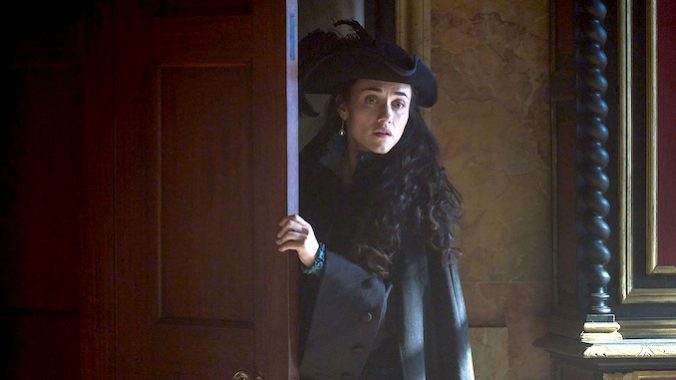Renegade Nell’s Sofia Wilmot Is the Morgana Pendragon Successor We’ve Been Waiting For
Photo Courtesy of Disney+

In 2012, during the final episode of BBC’s Merlin, Morgana Pendragon (Katie McGrath) took her final shuddering breath after being stabbed by her once-friend Merlin (Colin Morgan), ran through with a dragon-kissed sword. But prior to her untimely demise, Morgana represented the very best of female corruption and villainy on screen. Seduced by the call of dark magic, radicalized by a mentor figure, and ultimately shunned and abandoned by those closest to her in her quest for equality and liberation, Morgana remains one of TV’s greatest bad witches. And now, over a decade later, Disney+’s Renegade Nell finally gives fans of this iconic character a worthy successor: Alice Kremelberg’s Sofia Wilmot.
Introduced as the quiet and subservient widowed daughter to the imposing Lord Blanchford (Pip Torrens), Sofia’s journey towards becoming a villain begins the moment her brother Thomas (Jake Dunn) shoots their father. With a single bullet, her shaky position as the tentative woman of this household has fallen into the hands of her idiot brother and his childish impulses. The anxiety and desperation this shakes loose from her is palpable, especially once Thomas swiftly transforms from a drunken menace into a spooked, haunted mess seemingly overnight. So when the charming and mysterious Lord Poynton (Adrian Lester) alludes to a possible solution to their seemingly supernatural problem, the offer is simply too good to refuse. Shaken by the possibility of losing everything she’s ever known if the truth were to surface, she’s willing to do anything to perpetuate the lie that Nell Jackson (Louisa Harland) killed her father—even if this means tracking down this renegade and killing her. She trains under Poynton, who fosters the powerful magic that was already living within her, and rolls her into his dastardly plot to overthrow the Queen.
Her downward spiral is swift and drastic, shifting from the once-quiet woman who seemed conflicted at her brother’s cruel actions in the first episode to a ragingly powerful witch bent on murdering Nell. The series’ most shining achievement with its central villainess is the depth she’s given and the layers that are so skillfully injected into her every scene. On the surface, Sofia’s obsession with Nell stems, of course, from the fear of losing everything. Under her father, Sofia was a passive voice within the home, but at the very least, she had a roof over her head and some modicum of respect; under Thomas, who’s beginning to mentally deteriorate from the toll of his actions, she sees a future where her freedom is completely dependent on whoever might inherit Broadwater next assuming he can’t keep it together. The solution is simple: kill Nell Jackson so no one ever finds out Thomas killed their father, and she maintains her status and lavish home. But from a series this well-crafted and outstandingly performed, nothing is ever just simple.
Sofia is molded through a lethal combination of jealousy, intellect, and pride that sends her down her season-long arc, all heightened by the 1700s setting. In a society that holds so little value for women and actively scoffs at those with both intelligence and the confidence to share it, Sofia keens at any kind of praise and respect, especially from Poynton. Truthfully, Sofia couldn’t care less about actually overthrowing the Queen (she’s scandalized by Poynton’s admission that he is a Jacobite and clearly doesn’t share the same feelings at first). Yes, her involvement in this plot hinges on the potential power that position may provide, but she is equally motivated, if not more so, by the respect that Poynton offers her. The fact that someone recognized her intelligence and potential is enough to push her down any path, and it ultimately becomes a large part of her undoing as Poynton easily and cruelly betrays her in the season’s final episode.
Similarly, while she’s obsessed with Nell because she’s the loose thread that could potentially unravel her fragile position, a violent undercurrent of jealousy elevates this almost one-sided feud to even greater heights. Nell is a highwaywoman who wanders around in trousers and beats the daylights out of men because she is powerful and she can. She has no concern for polite society, toff order, and a woman’s “place,” and she represents everything that Sofia, at first, refuses to become. Ultimately, she doesn’t really hate Nell; she hates the social order that cast her aside once she was widowed, she hates the Lords who refuse to acknowledge her intelligence, and she hates the ways in which she’s had to twist and shape herself into something more brutal and cold in an effort to simply survive.
-

-

-

-

-

-

-

-

-

-

-

-

-

-

-

-

-

-

-

-

-

-

-

-

-

-

-

-

-

-

-

-

-

-

-

-

-

-

-

-








































